(Okay. A lot of sleep later, I think I'm good enough to write this up. It won't be my best work, but it'll get us through to the next round.)
Asoka awoke from his long slumber with the gleam of purpose in his eye. The time for empire building was finished. It was time to begin glorifying India, to make it pleasing to the gods and prove that Asoka's leadership could stand the test of time.
As orders for Temple construction spread across the Arabian Coast, the Holy Romans' emissary humbly petitioned a handout:
Engineering was a valuable military technology, and Charlemagne was at war with a number of civilizations that called India friend. But he was, to be fair, sorely outnumbered, and, as long as that war went on, the rest of the world's predatory eyes would be turned away from the riches of India. It was a cowardly move, Asoka knew, but rulership required a number of tough decisions. The emissary was sent off with a working knowledge of pulleys and levers. By the grace of the gods, perhaps India would be spared as the Holy Roman Empire became a stalemate.
The round was largely quiet on the military front. This was mostly due to the slugfest in Europe, as well as Justinian's decision to bypass another war with India in favor of engaging with more distant opponents:
Even during this time of relative peace, Tehran and Persepolis continued to train train soldiers skilled in the arts of defense and sent them to the borders to protect against inevitable invasion.
Commerce also thrived in those happy days. Resources were shipped across the continent, and profits went towards funding yet more research. Tamed Elephants were even sent westward to France in exchange for quality European Marble to go towards Cathedral building:
Ever since Louis converted to Hinduism, he has been significantly more reasonable in diplomatic matters. In fact, Asoka even went so far as to refer to him as "friend" in their correspondences.
1020 marked the founding of both Muscat on the tip of the Arabian peninsula and al-Kindi Academy in the Babylon urban core:
The Academy would, in the short run, provide a much-needed boost to research for the final push before the advance of Indian knowledge slowed to a crawl in favor of beautifications that would be pleasing to the gods. In the long run, it would provide a small but helpful boost to the city's Culture.
Muscat was quickly joined by the refounding of Justinian's forward base as a seat of Indian control over the region:
Both new cities were left to their own devices, in hopes of the Buddhist faith establishing themselves inside Indian borders. Sadly, Hinduism continued to prove its dominance in this part of the world. So much for the Apostolic Palace pushing its religion. Once the mother faith spread to both Muscat and New Trebizond, Taoist and Confucian Missionaries spread the empire's other religions, and Temples were built to bring favor and permit more Cathedrals.
Asoka's lifework was racognized as great, though he was, for the moment, outdone by the wily French:
Louis' sheer production, combined with his love of beauty and art in all things, makes France an early-game powerhouse in the realms of Culture. But his lack of territory, combined with his befuddled AI brain, should ultimately doom him in the end.
The Khmer, meanwhile, continued their bizarre march west, where they did make war with the distant Spanish. Suryavarman, their inscrutable leader, invited India along on his strange crusade:
Lord Asoka sent along his agreement and his best wishes, but he forbade any Indian-born soldiers from following this migration. The Khmer may be Friendly, but Asoka could not bring himself to trust them or their strange ways.
As the three great Indian faiths began to spread to every city, local clerics began to realize that their doctrines were being diluted, their faithful being reduced to faceless Temple-builders. Suspicious townsfolk began turning away increasing numbers of hastily-trained Missionaries:
Asoka was disheartened. The charges were not totally without merit, but one faith alone would not be sufficient to glorify India. He said a silent prayer and ordered the training of more men of faith. Even integrity must be compromised in the pursuit of greatness.
Not all religious news was bad, though. In 1110, the honorable Abu Bakr settled in Babylon, funneling tithes to the treasury and inspiring the people to be more productive:
Hardly the best possible Great Person, but better than a Spy.
With the discovery of the Printing Press, Lord Asoka had a valuable secret that he could trade around the world to restore India to technological parity:
With Philosophy obtained in trade and the Liberalism prize as yet unclaimed, Lord Asoka was sorely tempted by the siren call of the free technology. But Mansa Musa, craven leader of the Mali, possessed both Education and Philosophy. To aim to win the race this late would be a risky gamble.
But the Indian leader also knew that Education and Liberalism were, even in the absence of the free tech, worth having (particularly for the invaluable Free Speech civic) and, if the gamble paid off, it woud pay off in a big way. Lord Asoka emptied the treasury to Mansa Musa, hoping that it wasn't too late:
When news came later that the Mali had adopted the Free Market, Asoka breathed a sigh of relief. With the African king aiming for Economics rather than Liberalism, he had opened the door to an Indian victory. But other threats remained. Half the world was in the race. Inconsequential Techs were traded around for spare change, and all available resources were thrown into research.
A final trade was made with the Khmer to protect India's people from harm:
I'm convinced that the Khmer should not be trusted with Gunpowder, but there's not much I can do to take it away from them.
Finally, in 1260, the years of hardship paid off. The Liberalism race was, inexplicably, won! Here's a shot of 1270, to let you know what we can get with it:
We can also trade for Astronomy from Charlemagne, and take Scientific Method. I don't know if that's worth doing (it would, after all, kill off our Monasteries), but it would open up Biology and some other juicy techs, so I'll leave that up to you all.
So here's the world, now complete with the Americas:
We haven't colonized South America in a while. Is it worth doing at this point?
Here's a peek at the Domestic Advisor, sorted by Culture:
Tehran is currently a better city than Vishakhapatnam. I don't know if we should change horses midstream, or what. I mean, my thought is that, once we crank up the slider, Tehran's Production base simply won't be able to keep up with Vishakhapatnam's Commerce. Again, I'll leave that open to debate.
Here's the Tech screen:
It's too bad that I can't get Banking in time for Liberalism. Replacable Parts might have been another worthy alternative.
Finally, the Diplomacy screen:
According to Rolo, The Second Byzantine War is right around the corner, so that should be fun for the next round. Outside of that, is it time to turn off Research in favor of Culture? What should our Civics options be? And who shot J.R.?
The save is on my post on the previous page.








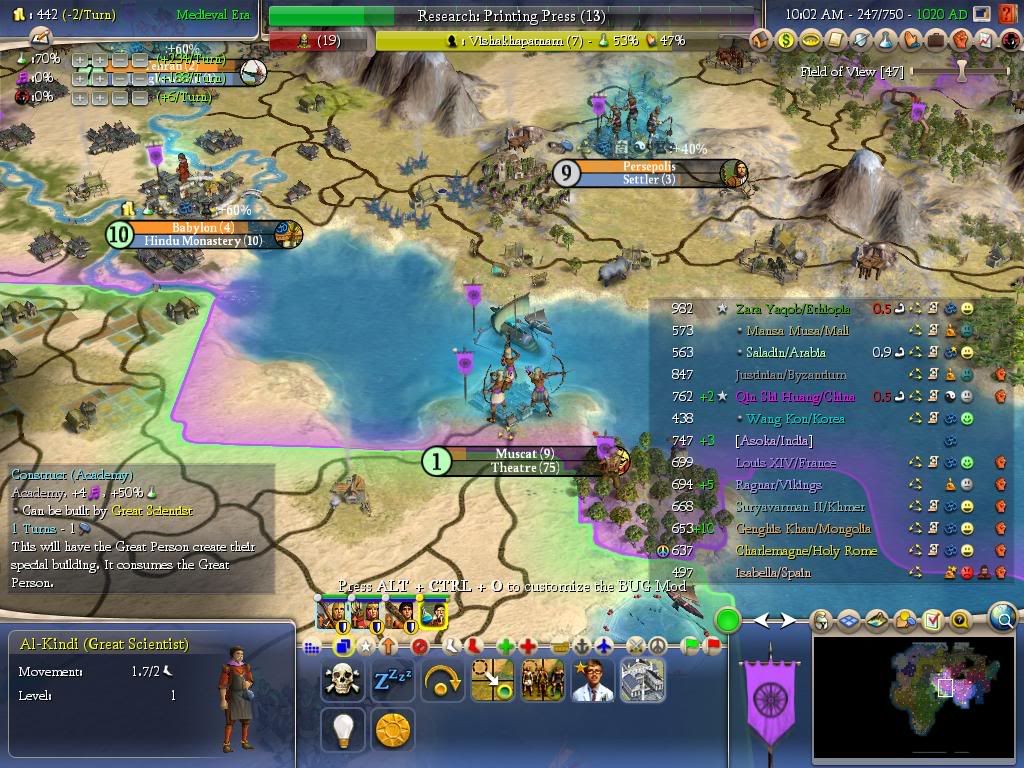
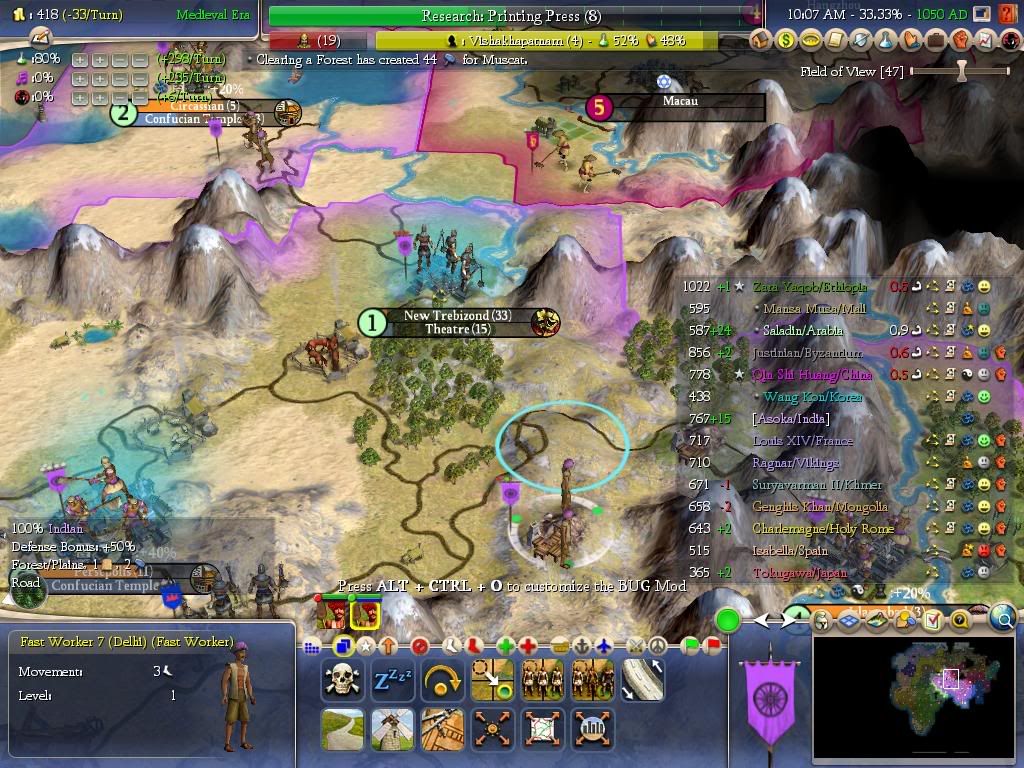

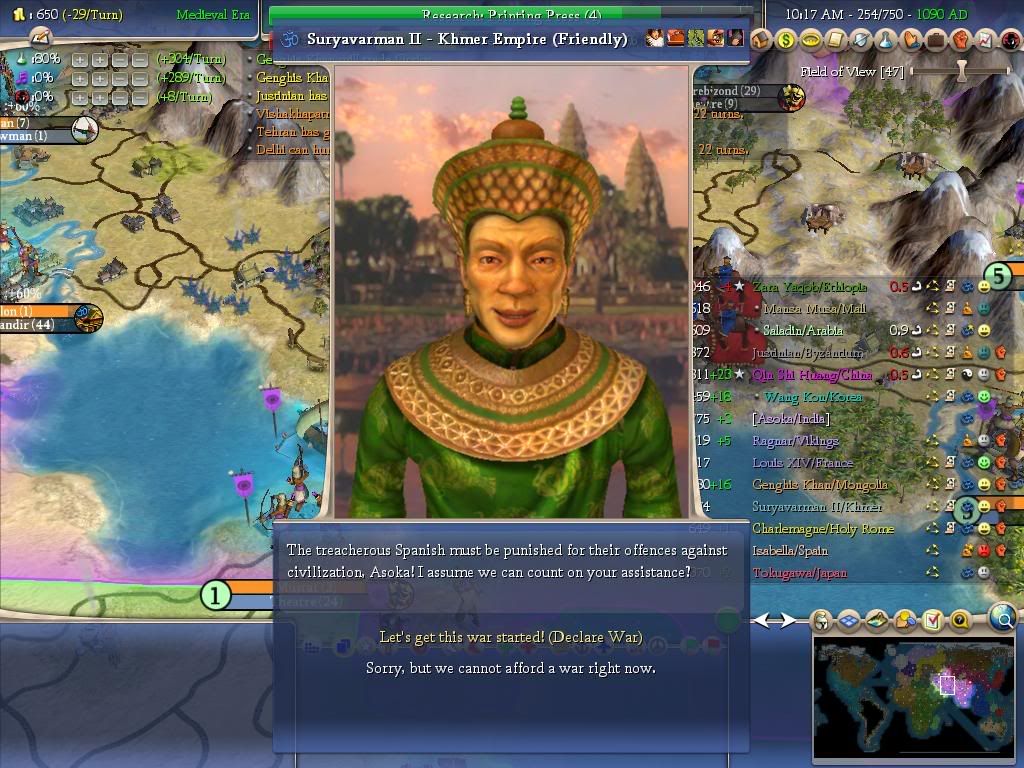

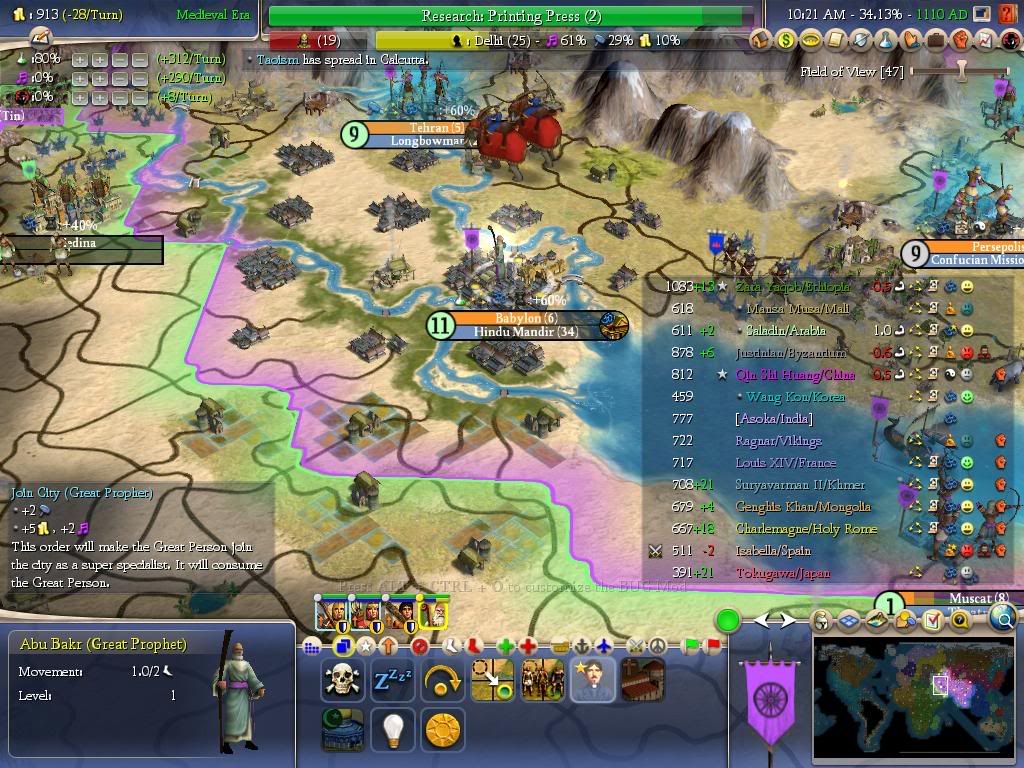
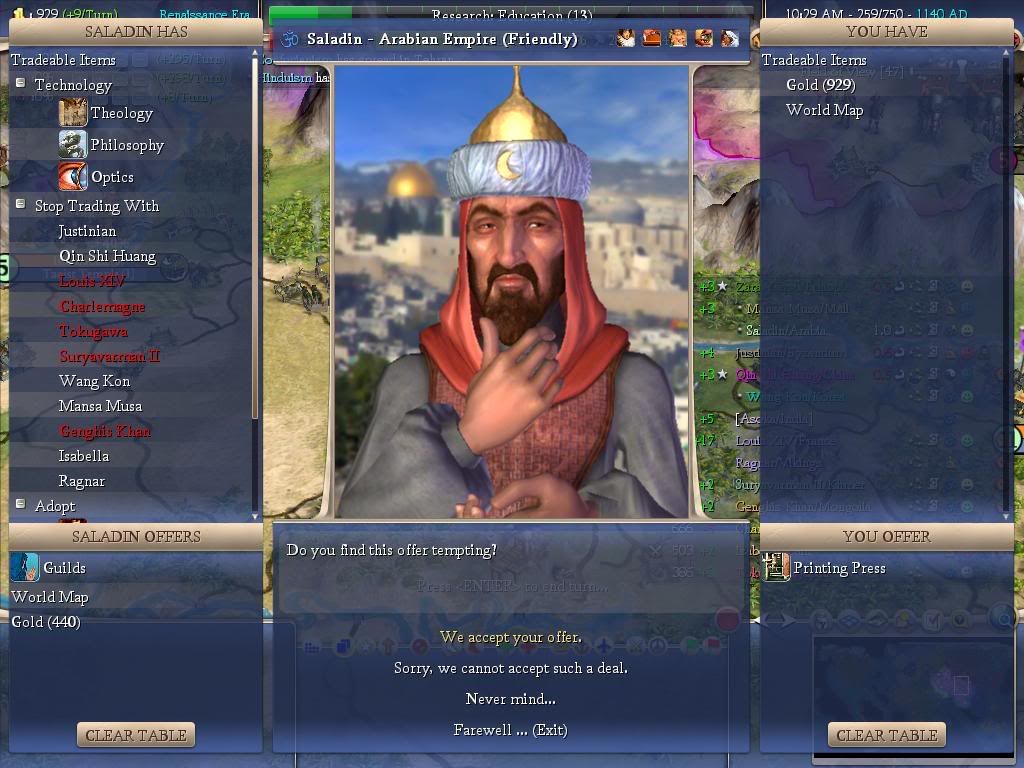


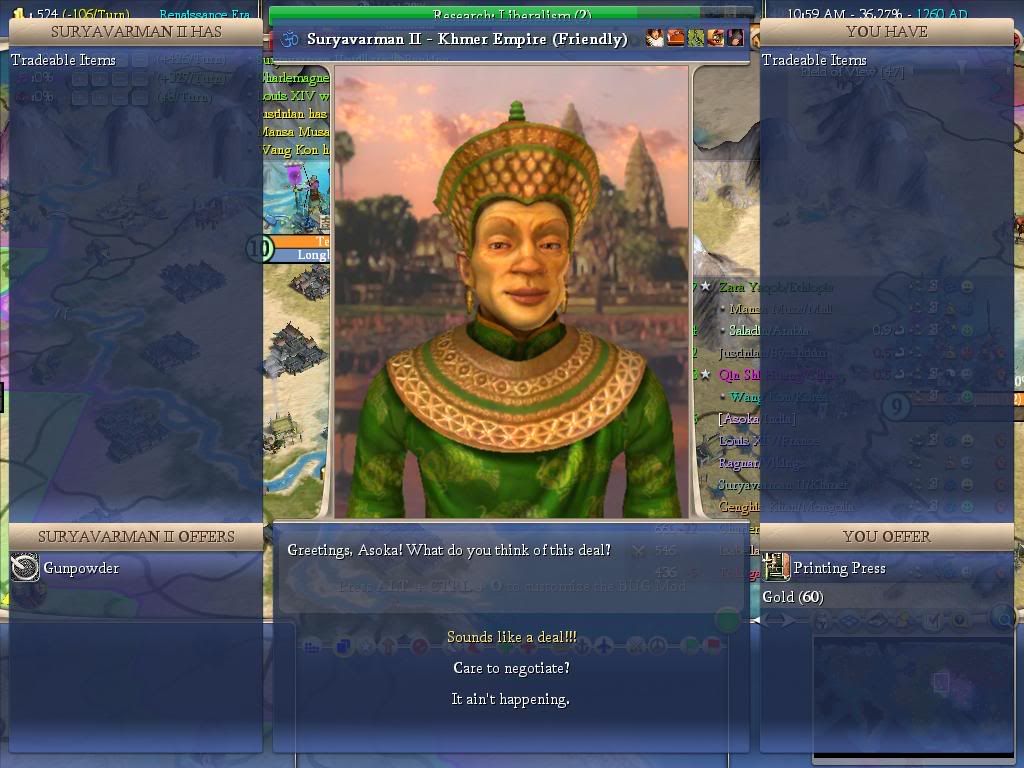

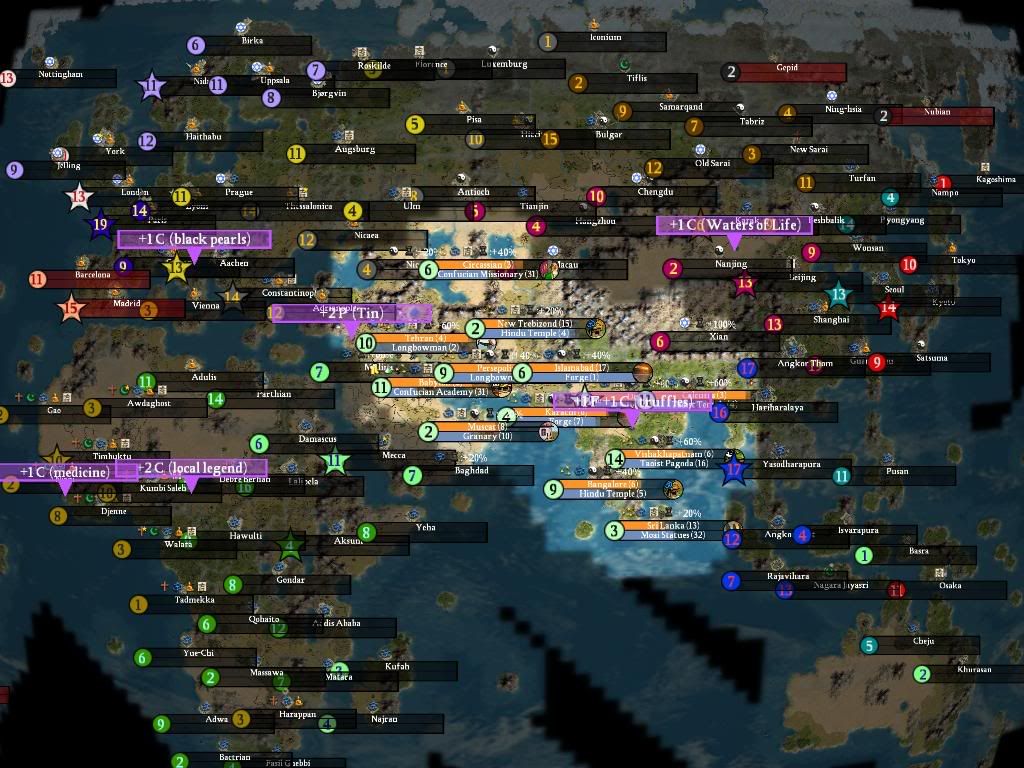

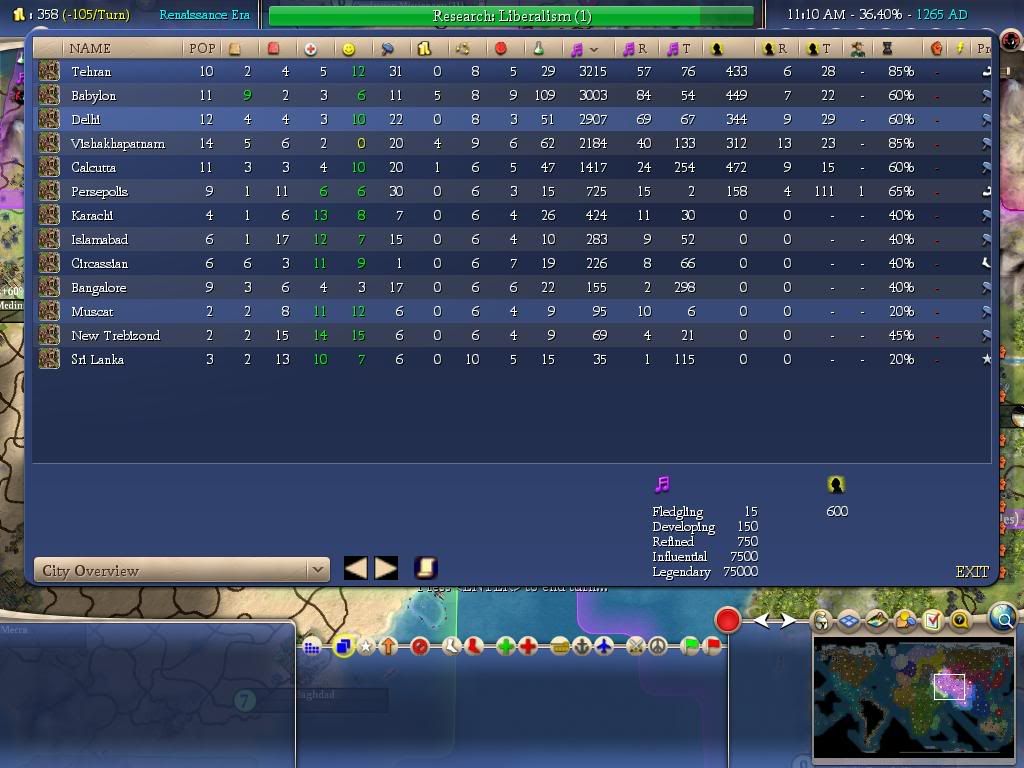


 if I remember correctly). If you do plan on continuing research, getting the Taj for a civics change right as you switch to culture could work wonders. They are both doubled by marble to boot (nice pick up there, by the way).
if I remember correctly). If you do plan on continuing research, getting the Taj for a civics change right as you switch to culture could work wonders. They are both doubled by marble to boot (nice pick up there, by the way). Never mind, don't listen to me
Never mind, don't listen to me


